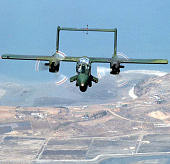 An Arizona man and his company Marsh Aviation have been indicted for conspiring to provide defense services to the Venezuelan Air Force and exporting military aircraft engine to Venezuela without the required licenses. The engines in question were Garrett T-76 turboprop engines used by the Venezuelan Air Force’s Bronco OV-10 multi-mission aircraft.
An Arizona man and his company Marsh Aviation have been indicted for conspiring to provide defense services to the Venezuelan Air Force and exporting military aircraft engine to Venezuela without the required licenses. The engines in question were Garrett T-76 turboprop engines used by the Venezuelan Air Force’s Bronco OV-10 multi-mission aircraft.
According to the indictment, Marsh Aviation was contacted on March 5, 2007, by a former officer of the Venezuelan Air Force who offered to represent the company before the Venezuelan Air Force with respect to the T-76 engines. The former officer acknowledged the U.S. arms embargo against Venezuela but stated that he knew of ways to avoid the embargo. Three days later $1.8 million dollars was wired into the personal account of the CEO of Marsh Aviation.
Thereafter in May 2007 there was further correspondence between Marsh and the former Venezuelan officer regarding the “completion” of Marsh’s contract to overhaul and to upgrade the T-76 engines. Thereafter, the engines were disassembled and exported to Venezuela as parts for the TPE331 engine, the civilian version of the T-76. A Marsh Aviation employee was then sent to Venezuela to put the engines back together.
The indictment states that the conspiracy began in November 2005 which provides some additional information as to what might have been going on here. The arms embargo against Venezuela went into place on August 17, 2006. What may have happened here was that the Venezuelan engines were shipped to Marsh in late 2005 and were still there when the embargo went into effect. Also it is likely that Marsh had finished some of the overhaul but wasn’t going to be paid until the engines were delivered to Venezuela. The arms embargo effectively confiscated from Marsh Aviation the money it was due under the contract.
When Marsh was contacted by the former Venezuelan officer, who likely was the one who cooked up the T-76/TPE331 switcheroo scheme as a means to for “completion” of the contract, Marsh jumped at the idea. Marsh might even have believed that the scheme was legal given the near identity of the two engines. Venezuela then sent Marsh $1.8 million dollars three days later. And the rest is history.
Granted this is largely speculation on my part. But it seems a reasonable speculation. And it is a reminder of one of the risks of defense exports — namely, that a U.S. exporter can be left holding the bag when an arms embargo intervenes between the beginning and end of a contract that will require the export of a defense article.
 Permalink
Permalink
Copyright © 2010 Clif Burns. All Rights Reserved.
(No republication, syndication or use permitted without my consent.)

 Posted by
Posted by  Category:
Category: 

